Amid Diplomatic Shake Up, Malians Think Country Moving in Right Direction
Tracking Global Events | 16 February 2023
Over the past few months, Mali’s military junta has upended the country’s alliances. They have sought closer ties with Russia, pushed France to the margins, and strained the country’s relationship with international organizations like the United Nations and the African Union. This trend has continued in early 2023 with the government expelling the Chief of the Human Rights Division of the U.N. Peacekeeping Mission (MINUSMA) and receiving visits from Russia’s Foreign Minister and Burkina Faso’s Prime Minister. Premise launched a survey to understand how contributors perceive the country’s safety, and to better understand sentiments on the country’s evolving alliances.
![]()
Insights
- 72% of respondents believe that Mali is generally moving in the right direction
- A majority of respondents also support the current military rule with 55% strongly supporting, 13% somewhat supporting, 21% choosing to not answer or to remain neutral; 10% opposed the military rule
- A majority of respondents feel the security situation is improving: 46% believe that Mali is much safer than it was a year ago, 19% believe is it slightly safer
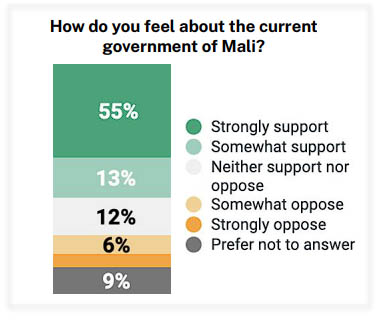
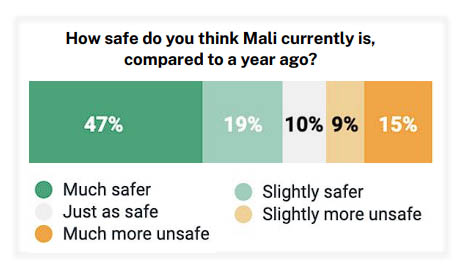
But majority of those that had heard this news were also support of the decision to expel the Chief with 41% strongly supporting, and 13% somewhat supporting. A further 31% chose to not answer or to remain neutral, and only a combined 15% opposed the expulsion.
Based on each contributor’s response to how safe they think the country is, we then asked them to select all the different factors they think have contributed to making the security situation better or worse.
Some of the top changes cited include efforts of the Malian Armed Forces, military support from Russia, and the withdrawal of French troops from the country.
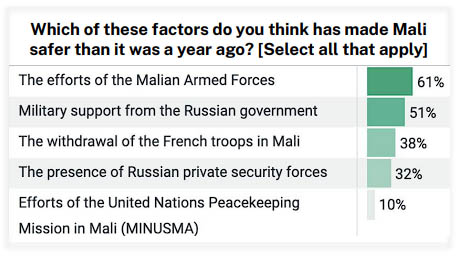
- A majority of respondents that had heard about Lavrov’s visit were in support of it with 53% strongly supporting, 16% somewhat supporting. A further 20% chose not answer or to remain neutral, while a combined 10% opposed the visit.
- One of the promises Lavrov made was to continue helping Mali to improve its military capabilities. We asked contributors to select the various ways this promise made them feel, and many contributors report being excited (46%) and hopeful (45%). Between 13 to 15% report also being worried for various reasons
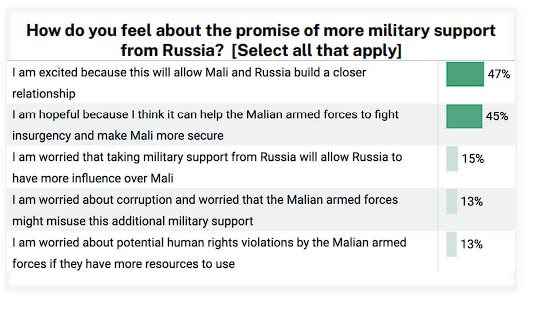
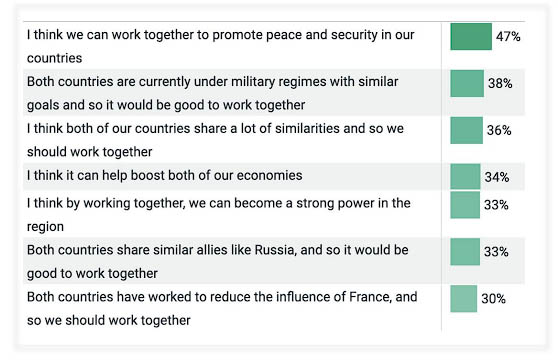
- A majority of respondents were in support of a federation between Mali and Burkina Faso, with 51% strongly supporting, and 24% somewhat supporting. While only a combined 8% oppose.
- People selected multiple reasons for this support ranging from their similar form of government (both countries are currently under military rule) to the belief that both countries can work together to promote peace and security.
Methodology
Using a method of convenience sampling, Premise collected sentiment data on these current event issues in Mali between February 8 to 15. In cases requiring rapid data collection, we utilize this type of nonprobability sampling involving the sample being drawn from the population that is ready to assist. We received about 900 submissions from mostly young males in all 8 regions and Bamako, the capital.
Outcome
Within 24 hours, Premise surveyed 500 Contributors achieving the following demographic breakdown:
- Gender: 70% male / 30% female
- Age: 18 to 25: 50% / 26 to 35: 35% / 36 to 45: 10% / 46 and above: 5%.